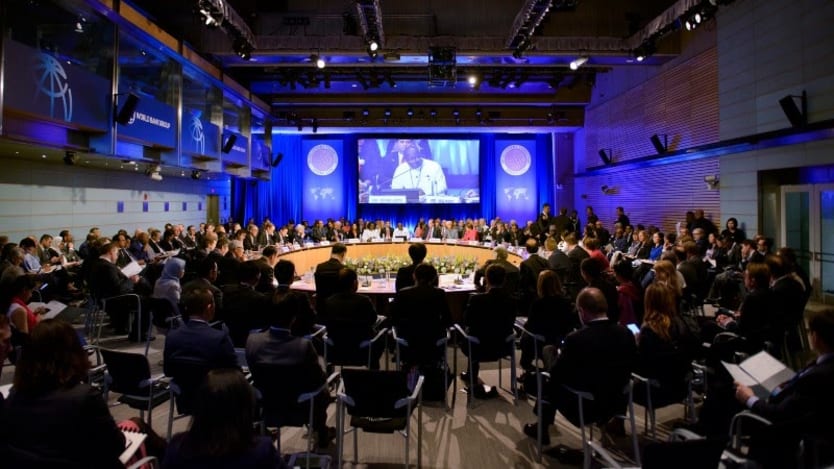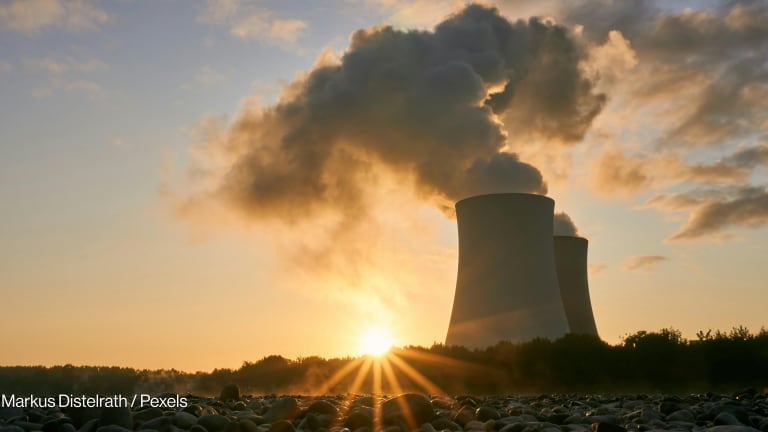
WASHINGTON — While the World Bank and International Monetary Fund’s Spring Meetings have been drastically scaled back, the stakes for this week’s gathering of the institutions’ shareholders are as high as they have ever been.
The World Bank Group Development Committee — composed of finance ministers from the bank’s member countries — is set to meet Friday in hopes of reaching a consensus on the role that the world’s most influential multilateral development bank will play in responding to the multifaceted global crisis brought about by the COVID-19 pandemic. The message that ministers deliver will be crucial in determining the scale and speed of the bank’s financial response, experts have said.
World calls Trump's funding freeze to WHO 'foolish', 'dangerous'
World leaders and influential global health figures condemn U.S. President Donald Trump's instructions to freeze funding to WHO amid the pandemic.
U.S. President Donald Trump’s attack on the World Health Organization has stoked fears of a breakdown in international leadership and support for the multilateral system, while advocates for a strong and sustained World Bank response to the pandemic hope that the institution will be spared from those political battles.
“The [multilateral development bank] system seems to have managed to avoid the wrath of this president, and perhaps that suggests there is more scope for them to be able to do more over time without threats for their funding being cut or otherwise impeded by political motivation,” said Scott Morris, senior fellow at the Center for Global Development, on Wednesday.
The World Bank has already announced plans to deploy up to $160 billion over the next 15 months to help countries respond to the immediate health crisis brought on by COVID-19 and to the economic fallout that is already materializing.
Three months ago the IMF predicted positive per-capita income growth in over 160 of its member countries in 2020. Today, it projects negative per-capita income growth in over 170 countries this year.
“The [multilateral development bank] system seems to have managed to avoid the wrath of this president, and perhaps that suggests there is more scope for them to be able to do more over time.”
— Scott Morris, senior fellow, Center for Global Development“It is really crucial for governments and also for international organizations to lean forward with all we have so that we can actually, collectively protect the world economy,” said Kristalina Georgieva, managing director of the IMF, at a press conference Wednesday.
“Some countries can do more, and we urge them to do it. And some countries need more help, and that is where the IMF and the multilateral development banks are so critical in this moment,” she said.
Some experts have said the World Bank and its peer MDBs have significantly more financial “firepower” that they could bring to bear on behalf of crisis management and recovery plans in their client countries — if the banks’ shareholders instill confidence in their leaders that they will see continued support in the months ahead.
According to an analysis from the Center for Global Development, the MDBs collectively have the legal authority to lend over $1 trillion, though their current lending practices are much more conservative. Whether they are willing to leverage their balance sheets more aggressively will depend significantly on the message they get from their shareholders — including this week at the Spring Meetings, Morris said.
“That’s a key thing to be looking for: What level of ambition do the governance actors, these finance ministers, define for these institutions, and what kind of assurances do they provide going forward?” he said.
That question could also determine how the World Bank and others weigh immediate financing needs against longer-term support, said Masood Ahmed, CGD’s president and a former director at the IMF.
If the World Bank gets some assurance from its shareholders that, if significant resources are deployed in the short term to help countries respond to the pandemic, those resources will be replenished later on, the bank’s “choices will not be distorted by trying to save money, because they’re not sure if they’re going to have money down the road,” Ahmed said.
“The shareholders need to give an assurance to the institution that they want them to do all that they can, and they will, in turn, come back and help to expand their capacity, if needed, down the road,” he added.
The World Bank has already initiated more than two dozen “fast-track” projects aimed at providing emergency support to ministries of health and other institutions tackling preparedness and response efforts in its client countries.
As financial institutions devise their own financial response plans, they will also have to ensure they are coordinating at the country level, according to Ahmed.
“What you want to very much avoid is a situation where you have a series of uncoordinated, parallel interventions in the next few months where everyone’s trying to help a particular country deal with the crisis and tripping over each other,” he said.
Search for articles
Most Read
- 1
- 2
- 3
- 4
- 5








